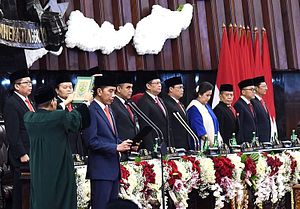Who does not remember Joko “Jokowi” Widodo’s victory speech after winning his first presidential election in 2014? It was iconic when Jokowi and his running mate stood an the deck of a traditional pinisi ship in the 500-year-old harbor of Sunda Kelapa. No one doubted then that Jokowi had sent a signal that the country would eagerly pursue something big in its long abandoned maritime realm. The signs were even clearer when the president delivered his inaugural speeches at the Indonesian parliament, the Asia Pacific Economic Cooperation (APEC) CEO Summit, and the ninth East Asian Summit, respectively. None of these addresses went by without mentioning the words “sea” or “maritime.” All of them contained one purpose: translating the Sanskrit mantra “Jalesveva Jayamahe” (“at sea we are victorious”) into a systematic narrative of Indonesia as the Global Maritime Fulcrum. The whole country appraised this novelty and immediately shifted its strategic focuses.
Five years later, when Jokowi seized his second presidential election triumph, many maritime enthusiasts expressed their disappointment at the lack of mentions of the words “seas” or “maritime” in his critical moments. There are legitimate grounds for concern. Different visions and missions about maritime issues might be the first proof for this argument. Whereas Jokowi’s submitted vision and mission document ahead of the 2014 election repeatedly outlined “realizing Indonesia as an archipelagic or maritime country,” the 2019 version touched on the topic only in a single sentence: “strengthening Indonesia’s position as an archipelagic country.” Although this could be seen as downscaling, it is still logically acceptable – the efforts needed to continue a policy is not be as huge as the effort required during its initiation. Jokowi as the incumbent also brought up his achievements in the maritime realm and discussed his future visions during three debates: in February regarding maritime resources, in March regarding defense, and in April regarding maritime development.
The first presidential speech after his second inauguration in October 2019 is slightly at odds with his campaign bullets and might be the second proof for the argument that the Global Maritime Fulcrum is fading. It is indeed true that no maritime-related words were explicitly touted during the address, but Jokowi did quote one interesting local proverb, “pura babbara’ sompekku … pura tangkisi’ golikku,” which means “my sails have been flapping in the wind, and my navigation has already set.” Without being too naïve, this could be a small symbol that the Global Maritime Fulcrum has not vanished but has started to gradually root into unconscious beliefs.
The announcement of Indonesia’s foreign policy priorities for 2019-2024, made by Foreign Minister Retno Marsudi several days ago, was also pointed out as another supporting evidence for the argument. Out of five themes outlined — economic diplomacy, protection of citizens, safeguarding territorial sovereignty and integrity, Indonesia’s leadership at the regional and international level, and diplomatic infrastructure — the word “seas” was not mentioned except in the context of the conclusion of the Code of Conduct (COC) in the South China Sea. But again, it’s not fair to judge the continuity of the Global Maritime Fulcrum by quantifying how frequently those words pop up. The same list of priorities also highlighted the ASEAN Outlook on the Indo-Pacific (AOIP), which counts the maritime sphere as one of its cooperative areas.
The debate on whether Jokowi’s second term would mean the twilight of its Global Maritime Fulcrum or not still needs to be settled. Begging to differ with mainstream opinions, I offer a relatively optimistic outlook for the continuity of this great notion. There is a lot of evidence in favor.
First, Jokowi designated the limited meeting on “addressing obstacles to sea-highways” as one of his first agenda items within just ten days after his inauguration. This is a valuable proof that Jokowi still has great concern for the attainment of the Global Maritime Fulcrum, particularly with regards to maritime connectivity.
Second, Jokowi is scheduled to speak regarding the South China Sea and the Indo-Pacific narrative at the 35th ASEAN Summit this weekend. Therefore, the president’s interests in maritime-related issues are likely to be reignited as well, since maritime diplomacy was unavoidably included in his campaign materials.
The understanding of the Global Maritime Fulcrum should also be expanded to note endeavors carried out by other agencies. The Coordinating Ministry for Maritime Affairs and Investments, for example, continuously organizes and concretizes cooperation under the sustainable maritime economy-based international network known as the Archipelagic and Island States (AIS) Forum. The Indonesian Coast Guard also pushed forward the creation of the ASEAN Coast Guard and Maritime Law Enforcement Forum as a tangible deliverable for regional maritime cooperation. The war against illegal fishing has been politically enhanced as the Ministry of Fisheries and Maritime Affairs recently signed the International Maritime Organization (IMO) Fishing Vessel Safety Declaration. And the Ministry of Foreign Affairs is definitely not in the backseat of these efforts. Aside from gathering support for post-AOIP practical cooperation, it also assembled several foreign ambassadors to follow up on Indonesia’s policy to send back waste imports.
After all, twilight has not come for Indonesia’s Global Maritime Fulcrum and it never will. As an archipelagic nation, the fulcrum is unavoidable homework that constantly needs to be done by everyone, not only by the president. Consequently, this narrative should no longer be treated as an end, but as a means. With that in mind, the Global Maritime Fulcrum is just a matter of time.
Muhammad Habib Abiyan Dzakwan is a research assistant at the Department of International Relations, Centre for Strategic and International Studies (CSIS) Indonesia. His research interests include maritime affairs, disaster management, environmental issues, and ASEAN.
































